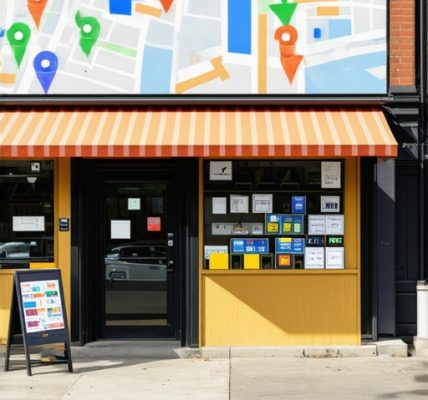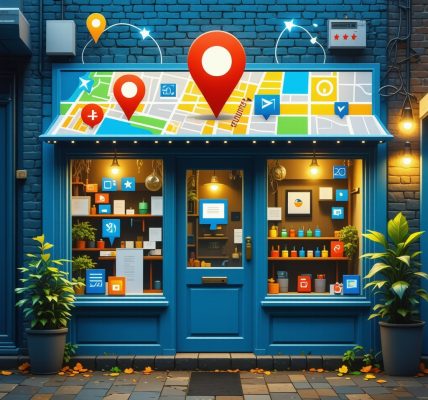Understanding Local Business Growth Strategies
As a local business owner, effectively growing your business requires a robust strategy that focuses not only on attracting customers but also on maintaining a strong online presence. One of the most effective ways to achieve this is through optimizing for local SEO. This involves tailoring your online marketing efforts to ensure that your business shows up in local search results, making it easier for potential customers to find you.
Why Local SEO is Essential for Business Growth
In today’s digital landscape, customers often turn to search engines to find local services or products. By optimizing for local SEO, businesses can enhance their visibility and reach a broader audience. This strategy not only drives traffic but can also lead to higher conversion rates as users searching for local services are often ready to make a purchase.
Local SEO encompasses various tactics such as citation consistency, optimizing Google My Business listings, and encouraging customer reviews. Implementing these practices can significantly impact your business’s growth trajectory.
Key Local Business Growth Strategies
Below are some critical growth strategies that local businesses should consider to enhance their local SEO:
1. Optimize Your Google My Business Listing
Your Google My Business (GMB) profile is crucial for local visibility. Ensure that all information is accurate and up-to-date, including your business name, address, phone number, and hours of operation. Utilize posts to engage with customers and showcase special offers or events.
2. Focus on Local Keywords
Incorporating locally relevant keywords into your website content and meta tags can significantly improve your chances of ranking higher in local search results. Think about what terms your potential customers might use when searching for your services and integrate these keywords naturally into your content.
3. Build Local Citations
Building citations in local directories can help improve your business’s authority and relevance. This includes ensuring consistent information across platforms such as Yelp, Yellow Pages, and other local business directories. Consistency is key to avoid confusing potential customers and search engines alike.
4. Encourage Customer Reviews
Positive customer reviews can enhance your business’s reputation and influence potential customers’ decisions. Encourage satisfied customers to leave reviews on platforms like Google, Yelp, and Facebook. Addressing negative reviews professionally can also demonstrate your commitment to customer satisfaction.
5. Create Location-Specific Content
Developing content that resonates with your local audience is another effective strategy. This may include blog posts about local events, partnerships with other local businesses, or highlighting community involvement. Creating engaging content can not only improve SEO but also foster a sense of community and loyalty among your customers.
Conclusion
Implementing these local business growth strategies centered around local SEO can help you not only attract more customers but also build a reputable online presence. As search engines continue to evolve, staying ahead with these tactics will ensure your local business can thrive in a competitive environment.
Understanding the Role of Local Content Marketing
Local content marketing is a powerful tool for enhancing your business’s visibility within your community. By creating content that speaks directly to your local audience, you can establish your brand as a trusted resource. This involves writing blog posts, creating videos, and sharing stories that reflect local culture and events, which can help build a loyal customer base.
1. Utilize Local Events and News
Staying updated on local events and news can provide you with valuable content ideas. Consider writing articles about upcoming events in your area, sponsoring local activities, or collaborating with other local businesses for joint promotions. This not only boosts your SEO but also fosters community engagement.
2. Leverage Social Media for Local Engagement
Social media platforms are essential for local businesses to connect with their audience. Regularly post updates, engage with followers, and share user-generated content that highlights your products or services in a local context. This can enhance your online presence and drive traffic to your website.
Importance of Mobile Optimization for Local Searches
With a growing number of consumers using mobile devices for local searches, optimizing your website for mobile is paramount. A mobile-friendly site improves user experience, decreases bounce rates, and increases the likelihood of conversions. Ensure your site loads quickly, is easily navigable, and features click-to-call buttons for convenience.
1. Implement Responsive Design
Responsive web design allows your website to adapt to various screen sizes, providing an optimal viewing experience for users on any device. This is crucial as search engines prioritize mobile-friendly sites in their rankings.
2. Optimize for Voice Search
As voice search becomes increasingly popular, it’s vital to adapt your SEO strategies accordingly. Incorporate natural language phrases and questions that users might speak when searching for local services. This can help you capture traffic from voice search queries.
Utilizing Online Reviews and Reputation Management
Your online reputation can significantly affect your local SEO performance. Encouraging satisfied customers to leave positive reviews on platforms such as Google My Business and Yelp can enhance your credibility and attract new clients. Additionally, managing your online reputation involves responding to reviews—both positive and negative—professionally and promptly.
1. Create a Review Generation Strategy
Develop a systematic approach to encourage customers to leave reviews. This can include follow-up emails post-purchase, offering incentives for reviews, or simply asking customers in person. The more positive reviews you have, the better your chances of improving local search rankings.
2. Address Negative Feedback Effectively
Handling negative reviews with grace can demonstrate your commitment to customer satisfaction. Responding constructively can turn a negative experience into a positive one and showcase your dedication to improving your services.
Conclusion
Incorporating these additional local SEO strategies can significantly enhance your business growth. By focusing on local content marketing, mobile optimization, and actively managing your online reputation, you can create a comprehensive approach that ensures your business stands out in local search results. Embracing these tactics will not only help attract more customers but also solidify your brand’s presence in the community.
Exploring the Impact of Local Link Building
Local link building is an essential part of increasing your business’s online authority and visibility. By acquiring links from reputable local sources, you can enhance your local SEO efforts. This can involve partnerships with local organizations, sponsoring community events, or contributing guest posts to local blogs. Each of these strategies not only fosters relationships within your community but also boosts your website’s credibility in search engines.
1. Partner with Local Businesses
Collaborating with other local businesses can be mutually beneficial. Consider exchanging links on your websites, which can help both parties improve their local search rankings. This strategy enhances your visibility while fostering a sense of community among local enterprises.
2. Get Featured in Local News Outlets
Local news websites often seek stories about businesses making a difference in the community. By reaching out to these outlets, you can gain valuable media coverage that includes backlinks to your site. This not only drives traffic but also positions your business as a local authority.
Maximizing Google My Business for Local SEO
Google My Business (GMB) is a free tool that allows you to manage your online presence across Google, including Search and Maps. Optimizing your GMB listing is crucial for local SEO, as it helps potential customers find essential information about your business quickly.
1. Complete Your Profile
Ensure that your GMB profile is fully completed with accurate information, including your business name, address, phone number, and operating hours. This consistency helps improve your local search rankings and ensures customers have the correct information.
2. Use High-Quality Images
Visual content plays a significant role in attracting customers. Upload high-quality images of your products, services, and team to your GMB profile. This can enhance user engagement and encourage potential customers to visit your location.
Engaging with Local Community Through Content
Creating content that resonates with your local audience is crucial for building relationships and driving traffic. This could involve writing blog posts that highlight local events or featuring interviews with community members. By doing so, you position your brand as an integral part of the local fabric.
1. Share Local Stories
Storytelling is a powerful marketing tool. Share stories about how your business has impacted the local community or feature local customers and their experiences with your products or services. This not only builds trust but also encourages shares and engagement.
2. Promote Local Events
Participating in or sponsoring local events can significantly boost your visibility. Promote these events on your website and social media platforms, and create content around them, such as event previews or recaps. This not only increases engagement but also positions your business as a community leader.
Conclusion
By implementing these local SEO strategies, you can enhance your online presence and drive more traffic to your business. Focus on local link building, optimizing your Google My Business listing, and actively engaging with your community through tailored content. These efforts will not only improve your search rankings but also strengthen your brand’s connection with the local audience.
Leveraging Social Media for Local Engagement
Social media platforms are powerful tools for enhancing your local SEO efforts. By actively engaging with your audience on platforms like Facebook, Instagram, and Twitter, you can foster relationships and drive traffic to your website. Regularly sharing updates about your business, community events, or local news can keep your audience informed and engaged.
1. Create Shareable Content
Developing content that resonates with your local audience can encourage shares and interactions. Consider creating polls, quizzes, or local guides that provide value to your community. This not only boosts engagement but also positions your brand as a local authority.
2. Use Location Tags and Hashtags
When posting on social media, utilize location tags and relevant hashtags to increase your visibility among local users. This can help potential customers discover your business while browsing through local content, thereby enhancing your local search rankings.
Utilizing Online Reviews for Local SEO
Online reviews play a crucial role in local SEO. Positive customer feedback not only enhances your reputation but also boosts your visibility in search results. Encourage satisfied customers to leave reviews on platforms like Google My Business and Yelp.
1. Respond to Customer Feedback
Engaging with customers by responding to reviews—both positive and negative—can improve your online reputation. Acknowledging positive feedback shows your appreciation, while addressing negative reviews demonstrates your commitment to customer satisfaction.
2. Implement a Review Strategy
Develop a strategy to solicit reviews from your customers. This could be through follow-up emails, in-store prompts, or social media posts. A consistent stream of positive reviews can significantly enhance your local SEO efforts.
Building Relationships with Local Influencers
Collaborating with local influencers can amplify your brand’s reach and credibility. Influencers often have established trust within their communities, making them valuable partners for promoting your business.
1. Identify Relevant Influencers
Research local influencers who align with your brand values and target audience. Reach out to them for potential collaborations, whether through sponsored posts, product reviews, or co-hosting events.
2. Create Authentic Partnerships
Authenticity is key in influencer marketing. Ensure that any partnership feels genuine and provides value to the influencer’s audience. This approach will yield better engagement and potentially drive more traffic to your website.
Conclusion
To effectively enhance your local SEO, leverage social media, actively manage online reviews, and build relationships with local influencers. These strategies not only improve your search rankings but also foster a stronger connection with your local community, ultimately driving more traffic to your business.
Frequently Asked Questions about Local SEO
1. What is local SEO and why is it important?
Local SEO is the practice of optimizing your online presence to attract more business from relevant local searches. It is important because a significant number of consumers use search engines to find local businesses, and local SEO helps you appear in these searches, increasing your visibility and customer base.
2. How can I improve my local SEO rankings?
Improving local SEO rankings can be achieved through several strategies, including optimizing your Google My Business listing, gathering online reviews, using local keywords in your content, and engaging with your community through social media and local partnerships.
3. What role do online reviews play in local SEO?
Online reviews significantly influence local SEO as they impact your business’s reputation and visibility. Positive reviews can improve your ranking on search engine results pages (SERPs) and attract more customers. Engaging with reviews also shows potential customers that you value feedback.
4. How can social media impact my local SEO efforts?
Social media can enhance local SEO by increasing brand awareness, driving traffic to your website, and facilitating community engagement. By sharing local content and utilizing location tags, you can reach a larger local audience and improve your search rankings.
5. What are the best practices for optimizing my Google My Business listing?
Best practices for optimizing your Google My Business listing include providing accurate and complete information about your business, regularly updating posts, adding high-quality images, encouraging customer reviews, and responding to those reviews promptly.
6. How important is mobile optimization for local SEO?
Mobile optimization is crucial for local SEO as many users search for local information on their mobile devices. A mobile-friendly website enhances user experience, which can lead to better engagement, lower bounce rates, and improved local search rankings.
7. Should I use local keywords in my content?
Yes, incorporating local keywords in your content is essential for local SEO. These keywords help search engines understand that your business is relevant to local searches, making it more likely for your website to appear in search results when users look for services in your area.
8. What is the impact of local backlinks on SEO?
Local backlinks can improve your local SEO by signaling to search engines that your business is a trusted authority in your area. Collaborating with local businesses, sponsoring community events, or being featured in local publications can help you build valuable backlinks.
9. How can I measure the success of my local SEO efforts?
You can measure the success of your local SEO efforts by tracking key performance indicators (KPIs) such as organic traffic, local search rankings, the number of customer calls or inquiries, online reviews, and engagement on social media platforms.
10. What tools can I use to enhance my local SEO strategy?
Some effective tools for enhancing your local SEO strategy include Google Analytics for tracking website performance, Moz Local for managing listings, SEMrush for keyword research, and BrightLocal for monitoring online reviews and local search rankings.
Authority Resources for Local SEO
For further reading and in-depth understanding of local SEO strategies, refer to the following trusted resources:
- Moz’s Comprehensive Guide to Local SEO – An extensive resource covering all aspects of local SEO.
- Search Engine Land’s Local SEO Guide – Insights into local search engine optimization techniques.
- BrightLocal’s Learning Hub – Educational content focusing on local SEO best practices.
- Neil Patel’s Local SEO Strategies – Valuable tips and strategies from a leading SEO expert.
- Ahrefs Local SEO Guide – A thorough explanation of local SEO tactics and how to apply them.
Conclusion
In conclusion, enhancing your local SEO requires a multifaceted approach that includes optimizing your online presence, engaging with your local community, and leveraging social media and reviews. By implementing the strategies outlined in this guide and utilizing trusted resources, you can significantly improve your local search visibility, attract more customers, and ultimately drive growth for your business.




This post really highlights the importance of local SEO for small businesses! As a local café owner, I can vouch for how crucial it is to have an optimized Google My Business listing. Since we updated our information and regularly post about our community events, we’ve seen a noticeable uptick in foot traffic and new customers. The strategy of encouraging reviews is also vital; we’ve found that responding to feedback, whether positive or negative, shows potential clients that we care about our customers’ experiences.
Moreover, I recently started creating content that highlights local collaborations and events, which has not only improved our SEO but also strengthened our ties with the community. It feels great to be a part of something larger while also promoting our services.
I also think mobile optimization can’t be overlooked! With so many people searching for local eateries on their phones, having a mobile-friendly website has really made a difference. Are there any specific tools you’d recommend for managing local citations effectively?
Hi Emily, I completely agree with your insights on the power of an optimized Google My Business profile and engaging content to boost local SEO. In my experience managing a boutique retail store, consistency in local citations is equally crucial. Tools like BrightLocal and Moz Local have been game changers for me in managing and tracking citations across various directories. They help maintain NAP (Name, Address, Phone Number) consistency, which seems to be a foundational factor that search engines value highly for local rankings.
One challenge I’ve faced is balancing the creation of authentic location-specific content with the risk of appearing too promotional. I found that storytelling about local partnerships or community impacts resonates well without feeling like overt marketing. It encourages genuine engagement from the local audience, which in turn contributes positively to SEO.
Also, with the rise of voice search, adapting content to include more conversational and question-based local keywords has improved our visibility.
I’d be interested to hear how others approach generating location-specific content that strikes this balance well. What strategies do you, or other local business owners, use to ensure your content feels both authentic and SEO-friendly?
Building on the discussion about local SEO growth strategies, I’ve noticed that while optimizing Google My Business and managing reviews are foundational, the real game-changer has been integrating local link building into the mix. Partnering with other local businesses for cross-linking has helped boost our website’s authority in the eyes of search engines, and it also creates authentic community connections. Additionally, featuring our participation in local events through blog posts and social media updates has brought a lot of organic engagement. This approach not only supports SEO but also reinforces our identity within the community.
Mobile optimization is absolutely crucial too. We implemented responsive design and ensured our contact details are always click-to-call enabled, which has made it effortless for customers to reach us directly from their phones. Moreover, adapting content for voice search by including natural question phrases has surprisingly improved our reach among tech-savvy audiences.
I’d be curious to learn how others manage the balance between creating SEO-friendly content and keeping it genuinely engaging for the local community. How do you maintain authenticity while still addressing SEO requirements in your content marketing?